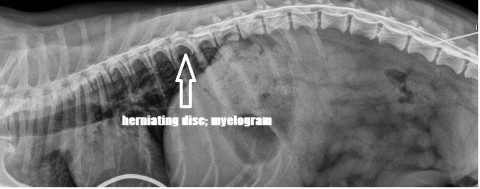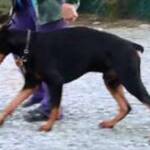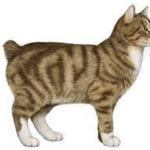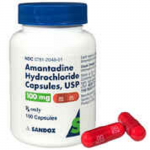Cervical (neck) disk disease is an intervertebral disk pressing on the spinal cord, causing pressure and pain. It’s essentially the same condition as intervertebral disk disease, except it occurs in the neck instead of in the back.
Intervertebral disks are located between the vertebrae (bones of the spine). Each disk has two parts, a fibrous outer layer and the jelly-like interior. When disk herniation occurs, the interior either protrudes (bulges) or extrudes (ruptures) into the vertebral canal, where the spinal cord resides.
 The onset of herniations can be either acute or chronic. Generally speaking, when this type of herniation happens in the neck, disk disease is the most likely cause, although it can be due to trauma (falling off furniture or a deck, getting hit by a car, collar trauma, etc.). Small chondrodystrophic breeds – those with a long back such as dachshunds, for example – are the breeds most typically affected, although other breeds can be affected. It’s more common in middle-aged pets.
The onset of herniations can be either acute or chronic. Generally speaking, when this type of herniation happens in the neck, disk disease is the most likely cause, although it can be due to trauma (falling off furniture or a deck, getting hit by a car, collar trauma, etc.). Small chondrodystrophic breeds – those with a long back such as dachshunds, for example – are the breeds most typically affected, although other breeds can be affected. It’s more common in middle-aged pets.
When the spinal cord is compressed by cervical disk material, the dog or cat can experience signs ranging from mild (neck pain) to severe (complete paralysis of all four legs and with no pain perception).
Usually, the neck signs appear suddenly. The neck muscles may tense up or shiver, the pet’s nose may point toward the ground, the pet’s back may arch, and there may be muscle tremors in the neck and shoulder. The pet is usually reluctant to move his head from side to side or to lift his chin. Sometimes nerve control of urinary and bowel functions will be affected.
Other signs may include clumsiness and paralysis. Severe damage to the spine will have severe effects and a worse prognosis than mild damage. Chronic spinal cord damage also has a worse prognosis.
An acute onset is an absolute emergency, and the pet should be seen immediately by a veterinarian.
Diagnosis
After obtaining your pet’s medical history, your veterinarian will perform a general physical examination and then a neurological examination. The veterinarian will see how much pain perception your pet has; inability to feel any pain is not good. Radiographs are usually taken, although they may not be definitive. If possible, a myelogram (where dye is injected into the spinal canal), MRI, or a CT scan will be run.
Treatment
Treatment options depend on how severe the problem is. If the situation is mild, it may be treated with just medication, typically anti-inflammatories or glucocorticoids, and crate rest. If the problem resolves on therapy, but recurs when treatment is finished, surgery may be required.
More serious cases may require surgery, although surgery is not an instant cure. The surgeon will remove the extruded disk material to take pressure off the spinal cord. Surgery does nothing to the cord itself. It takes time for the spinal cord to heal, but the good news is that the neck portion of the spinal cord is more tolerant of pressure from the extruded disk material than the back portion is.
Strict crate rest is necessary for either medical or surgical management. If your pet is not confined to strict crate rest, the herniation could recur and possibly be worse than the original episode. After surgery, your pet will probably require a month of crate rest. Another month of restricted activity may then be necessary. During that month, the use of steps should be avoided, and there should be no heavy exercise. If you customarily use neck collars or choke collars on your dog, those should not be used for another three months; body halters would be less likely to cause trauma to your dog’s neck.
Prognosis
Your pet’s prognosis depends, of course, on his particular case. Generally speaking, if he could walk at all before surgery, his post-surgical prognosis is excellent. If he couldn’t walk, but still had some deep pain sensation, the post-surgical prognosis is good to excellent. If he lost deep pain sensation completely, the prognosis is guarded.
Houston Heights Veterinarian for Dogs and Cats
Urban Animal Veterinary Hospital
1327 Yale St
Houston, TX 77008
(713) 863-008


